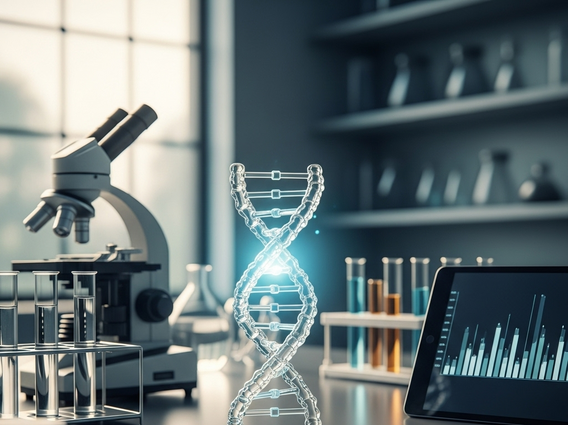Genetic Testing for Cancer Risk
Genetic testing for cancer risk is a powerful tool that offers insights into an individual’s inherited predisposition to developing certain cancers. By analyzing specific genes, it can identify mutations that significantly increase the likelihood of cancer, empowering individuals and their healthcare providers to make informed decisions about prevention and early detection.

Key Takeaways
- Identification of Risk: Genetic testing for cancer risk identifies inherited gene mutations that increase a person’s chances of developing certain cancers.
- Proactive Management: Positive results can lead to personalized screening schedules, risk-reduction strategies, and early detection efforts.
- Informed Decisions: Understanding your genetic predisposition allows for informed discussions with healthcare providers about preventative measures.
- Considerations: The process involves genetic counseling to understand potential benefits, risks, and the implications of results for individuals and their families.
- Accessibility: While costs vary, insurance often covers testing for those who meet specific criteria, and financial assistance programs may be available.
What is Genetic Testing for Cancer Risk?
Defining genetic testing for cancer risk
Genetic testing for cancer risk involves analyzing a person’s DNA to identify inherited mutations in specific genes that are known to increase the likelihood of developing certain types of cancer. Unlike tests that look for cancer itself, this type of testing focuses on inherited predispositions, meaning the genetic changes are present from birth and can be passed down through families. Understanding what is genetic testing for cancer risk is the first step in exploring this important health tool.
These mutations are often found in genes responsible for repairing damaged DNA or suppressing tumor growth. When these genes don’t function correctly due to an inherited mutation, cells are more prone to accumulating further genetic damage, which can lead to cancer over time. It’s a proactive measure, not a diagnostic one for existing cancer.
How genetic testing for cancer works
The process of how genetic testing for cancer works begins with a simple sample, typically blood or saliva, which contains your DNA. This sample is then sent to a specialized laboratory where technicians extract the DNA and analyze it for specific gene mutations associated with cancer syndromes. For example, common tests look for mutations in genes like BRCA1 and BRCA2, which are linked to an increased risk of breast, ovarian, prostate, and pancreatic cancers. Other genes, such as those involved in Lynch syndrome (e.g., MLH1, MSH2, MSH6, PMS2, EPCAM), are associated with colorectal and endometrial cancers.
Advanced sequencing technologies are used to read the genetic code and compare it against a reference sequence to identify any variations or mutations. The results are then interpreted by geneticists and genetic counselors, who assess their clinical significance and prepare a comprehensive report for the patient and their healthcare provider.
Common Genes Associated with Cancer Risk
Several genes have been identified where mutations significantly increase cancer risk. Knowing these can help individuals and their doctors understand potential predispositions:
- BRCA1 and BRCA2: Primarily associated with hereditary breast and ovarian cancer, but also linked to prostate and pancreatic cancers.
- MLH1, MSH2, MSH6, PMS2, EPCAM: These genes are involved in Lynch syndrome, increasing the risk of colorectal, endometrial, and other cancers.
- TP53: Mutations in this gene are linked to Li-Fraumeni syndrome, which predisposes individuals to a wide range of cancers at young ages.
- CDH1: Associated with hereditary diffuse gastric cancer and lobular breast cancer.
- APC: Mutations cause Familial Adenomatous Polyposis (FAP), leading to numerous colon polyps and a high risk of colorectal cancer.
The Process of Genetic Testing for Cancer Risk
Steps in genetic testing for cancer risk
Engaging in genetic testing for cancer risk typically follows a structured path to ensure informed consent, accurate results, and appropriate follow-up. The journey often begins with a referral from a primary care physician or specialist, especially if there’s a strong family history of cancer or other indicators.
The steps in genetic testing for cancer risk are designed to guide individuals through the complexities of genetic information. This process ensures that patients understand what the test can and cannot tell them, as well as the potential implications for their health and family.
- Genetic Counseling (Pre-Test): This crucial step involves meeting with a genetic counselor to discuss family medical history, assess personal risk, understand the test’s purpose, potential results, and implications.
- Sample Collection: A simple biological sample, usually blood or saliva, is collected in a clinical setting.
- Laboratory Analysis: The sample is sent to a specialized lab for DNA extraction and sequencing to identify specific gene mutations.
- Genetic Counseling (Post-Test): Once results are ready, another session with a genetic counselor helps interpret the findings, discuss medical management options, and address any emotional or ethical concerns.
- Medical Management: Based on the results, a personalized healthcare plan is developed, which may include increased surveillance, preventative measures, or referrals to specialists.
Types of genetic tests for cancer risk
The landscape of genetic testing has evolved, offering various approaches depending on the individual’s specific situation and suspected genetic predisposition. The types of genetic tests for cancer risk range from highly targeted analyses to broader screenings.
- Single-Gene Testing: This approach focuses on analyzing a specific gene when there’s a strong suspicion of a mutation in that particular gene (e.g., testing only for BRCA1/2 mutations).
- Multi-Gene Panel Testing: This is a more common approach, where multiple genes associated with a specific cancer type or syndrome are analyzed simultaneously. For example, a breast cancer panel might include BRCA1, BRCA2, PALB2, CHEK2, and ATM.
- Whole Exome Sequencing (WES) / Whole Genome Sequencing (WGS): These comprehensive tests analyze a much larger portion of the DNA (exome) or the entire genome. While powerful, they can also yield variants of uncertain significance (VUS) and incidental findings, requiring careful interpretation.
Preparing for Your Genetic Test
Preparation for genetic testing for cancer risk is relatively straightforward but important for ensuring a smooth process and accurate results. The primary preparation involves gathering comprehensive family medical history, particularly details about cancer diagnoses among relatives, including types of cancer and ages of onset. This information is vital for the genetic counselor to assess your risk accurately and recommend the most appropriate test.
Physically, there are usually no special dietary restrictions or fasting requirements for blood or saliva samples. However, it’s always best to confirm any specific instructions with your healthcare provider or the testing facility. Mentally, preparing for the potential outcomes and discussing them with a genetic counselor beforehand can help manage expectations and reduce anxiety.
Benefits of Genetic Testing for Cancer Risk
Early detection and prevention with genetic testing for cancer
One of the most significant advantages of genetic testing for cancer risk is its potential to facilitate early detection and prevention. For individuals identified with an increased genetic predisposition, healthcare providers can implement tailored screening protocols that begin earlier and occur more frequently than standard recommendations. This proactive approach dramatically improves the chances of detecting cancer at its most treatable stages, or even preventing its onset altogether.
The benefits of genetic testing for cancer extend beyond just knowing your risk; they translate into actionable strategies for health management. Early detection and prevention with genetic testing for cancer can be life-changing, offering a pathway to mitigate risks that might otherwise go unnoticed until symptoms appear.
- Enhanced Surveillance: Recommendations for more frequent mammograms, MRIs, colonoscopies, or other screenings.
- Prophylactic Surgeries: Consideration of risk-reducing surgeries, such as prophylactic mastectomy or oophorectomy, for very high-risk individuals.
- Chemoprevention: Use of medications to reduce cancer risk in certain cases.
- Lifestyle Modifications: Guidance on specific lifestyle changes that may further reduce risk.
Personalized health plans from genetic testing for cancer
The results of genetic testing for cancer risk allow for the creation of highly personalized health plans. Instead of a one-size-fits-all approach, individuals with identified genetic mutations receive medical guidance specifically tailored to their unique risk profile. This can involve a multidisciplinary team of specialists, including oncologists, surgeons, and gynecologists, all working together to manage the elevated risk.
These personalized health plans from genetic testing for cancer are dynamic, evolving with new research and an individual’s changing health status. They empower patients to take an active role in their health, making informed decisions based on concrete genetic information.
Informing Family Members
A profound benefit of genetic testing for cancer risk is the ability to inform and potentially protect family members. Since inherited genetic mutations run in families, a positive test result for one individual can prompt other blood relatives to consider their own genetic testing. This cascade testing can identify at-risk family members who can then also benefit from early detection and prevention strategies, potentially saving lives across generations.
Sharing genetic information within a family, guided by genetic counselors, can be a powerful tool for collective health management, allowing relatives to make informed decisions about their own health screenings and preventative care.
Summary of Benefits
| Benefit Category | Description |
|---|---|
| Proactive Management | Enables earlier, more frequent screenings and preventative measures. |
| Personalized Care | Tailors medical management and surveillance plans to individual risk. |
| Family Insights | Provides critical information for at-risk blood relatives. |
| Reduced Anxiety | For some, understanding risk can lead to peace of mind and informed action. |
| Empowerment | Allows individuals to take an active role in their health decisions. |
Risks and Limitations of Genetic Testing for Cancer Risk
Potential emotional and ethical risks of genetic testing for cancer
While genetic testing for cancer risk offers significant advantages, it’s essential to acknowledge the potential emotional and ethical risks. Receiving a positive test result can be emotionally challenging, leading to increased anxiety, fear, or even guilt, especially if other family members are also at risk. Conversely, a negative result might create a false sense of security, leading individuals to neglect standard cancer screenings.
The potential emotional and ethical risks of genetic testing for cancer extend to concerns about genetic discrimination in areas like employment or insurance, although laws like the Genetic Information Nondiscrimination Act (GINA) in the U.S. aim to protect against this. Discussing these concerns with a genetic counselor before testing is vital.
- Psychological Distress: Increased anxiety, depression, or fear following a positive result.
- Survivor’s Guilt: Feeling guilty if one tests negative while other family members test positive or have cancer.
- Family Dynamics: Potential for tension or conflict within families regarding sharing results or differing opinions on testing.
- Genetic Discrimination: Although legally protected in some areas, concerns about discrimination persist.
Understanding the limitations of genetic testing for cancer risk
It’s crucial to have a clear understanding of the limitations of genetic testing for cancer risk. A positive result indicates an increased risk, but it does not guarantee that an individual will develop cancer. Many factors, including lifestyle and environment, also play a role. Conversely, a negative result does not mean zero risk; most cancers are sporadic, meaning they are not caused by inherited genetic mutations.
Furthermore, current genetic tests do not cover all possible cancer-causing mutations, and new discoveries are constantly being made. Understanding the limitations of genetic testing for cancer risk helps manage expectations and ensures that individuals continue to adhere to general health guidelines and screenings.
- Not All Cancers Are Genetic: The majority of cancers are sporadic, not caused by inherited mutations.
- Incomplete Penetrance: Even with a pathogenic mutation, not everyone will develop cancer (incomplete penetrance).
- Variants of Uncertain Significance (VUS): Test results can sometimes identify genetic changes whose impact on cancer risk is not yet fully understood, leading to ambiguity.
- Limited Scope: Current tests may not detect all known cancer-causing mutations, and undiscovered genes or mutations exist.
- Environmental Factors: Genetic risk is only one piece of the puzzle; lifestyle and environmental factors also contribute significantly to cancer risk.
Navigating Ambiguous Results
One of the more challenging aspects of genetic testing for cancer risk is receiving ambiguous results, often referred to as Variants of Uncertain Significance (VUS). A VUS is a change in a gene that has not been clearly classified as either benign (harmless) or pathogenic (disease-causing). These results can be perplexing, as they don’t provide a clear answer regarding cancer risk.
When faced with a VUS, genetic counselors play a critical role in explaining what this means. Typically, a VUS does not change current medical management recommendations, and individuals are advised to follow standard screening guidelines based on their family history and other risk factors. Over time, as more research is conducted and more people are tested, some VUS classifications may be updated to benign or pathogenic.
Who Should Consider Genetic Testing for Cancer Risk?
Family history and genetic testing for cancer risk
The decision of who should get genetic testing for cancer is primarily guided by an individual’s personal and family medical history. A strong family history of certain cancers is often the most compelling reason to consider testing. This includes patterns such as multiple relatives on the same side of the family with cancer, early-onset cancers (e.g., breast cancer before age 50), or rare cancers.
Specific criteria help healthcare providers determine if genetic testing for cancer risk is appropriate. These guidelines are developed by professional organizations and are regularly updated to reflect new research and understanding of hereditary cancer syndromes. Understanding your family history is a critical first step in this evaluation.
- Multiple relatives with the same type of cancer: Especially on the same side of the family.
- Early-onset cancer: Diagnosis of cancer at a younger age than typically expected (e.g., breast cancer before 50, colorectal cancer before 50).
- Rare cancers: Such as male breast cancer, ovarian cancer, or pancreatic cancer.
- Known genetic mutation in the family: If a close relative has already tested positive for a cancer-causing genetic mutation.
- Certain ethnic backgrounds: Some populations have a higher prevalence of specific mutations (e.g., Ashkenazi Jewish ancestry and BRCA mutations).
- Multiple primary cancers in one individual: Developing more than one distinct cancer (e.g., breast cancer in both breasts, or breast and ovarian cancer).
Consulting a specialist for genetic testing for cancer
Given the complexity of genetic information and its implications, consulting a specialist for genetic testing for cancer is highly recommended. Genetic counselors are healthcare professionals with specialized training in medical genetics and counseling. They can accurately assess your risk, explain the testing process, interpret results, and provide guidance on managing potential risks.
A genetic counselor can help you navigate the emotional, ethical, and medical aspects of genetic testing, ensuring you make informed decisions that align with your personal values and health goals. They are an invaluable resource throughout the entire process.
Personal Cancer History
Beyond family history, an individual’s personal cancer history can also be a strong indicator for genetic testing. If someone has been diagnosed with certain types of cancer, especially at a young age, or has had multiple primary cancers, genetic testing may be recommended. For example, a woman diagnosed with triple-negative breast cancer before age 60, or any woman diagnosed with ovarian cancer, might be advised to undergo genetic testing regardless of family history.
Similarly, individuals with specific pathological features in their tumor, such as microsatellite instability (MSI) in colorectal cancer, may also be candidates for genetic testing to check for underlying hereditary syndromes like Lynch syndrome. This can influence not only their own treatment but also the screening recommendations for their family members.
Understanding Results and Cost of Genetic Testing for Cancer Risk
Interpreting genetic test results for cancer
Interpreting genetic test results for cancer requires careful consideration and is best done with the guidance of a genetic counselor. Results are typically categorized into three main types: positive, negative, or a variant of uncertain significance (VUS).
- Positive Result: Indicates that a pathogenic (disease-causing) mutation was found. This means you have an increased risk of developing certain cancers. It does not mean you will definitely get cancer, but it informs a higher probability.
- Negative Result: Means no known pathogenic mutation was found in the genes tested. This significantly reduces, but does not eliminate, your inherited risk. You still have the general population risk for cancer.
- Variant of Uncertain Significance (VUS): A change in a gene was found, but it’s not yet clear if it’s benign or pathogenic. VUS results are common and often reclassified over time as more data becomes available. They typically do not change medical management in the short term.
A genetic counselor will explain what your specific results mean for your health, your family, and what steps you can take next for surveillance or risk reduction. Understanding genetic test results cancer is a crucial step in personalizing your healthcare journey.
Cost of genetic testing for cancer risk
The cost of genetic testing for cancer risk can vary significantly depending on the type of test (single gene vs. multi-gene panel), the laboratory performing the analysis, and your insurance coverage. Without insurance, costs can range from a few hundred to several thousand dollars. However, for many individuals, the cost is substantially reduced or fully covered.
Insurance companies often cover genetic testing if an individual meets specific criteria, such as a strong personal or family history of cancer that suggests a hereditary cancer syndrome. It is always advisable to contact your insurance provider directly to understand your benefits and any out-of-pocket expenses before proceeding with testing. The cost of genetic testing for cancer risk should not be a barrier to necessary medical evaluation.
Insurance Coverage and Financial Aid
Navigating insurance coverage for genetic testing can be complex. Most major insurance providers, including Medicare and Medicaid, will cover genetic testing for cancer risk if medical necessity criteria are met. These criteria typically involve a personal or family history consistent with a hereditary cancer syndrome, as determined by a healthcare professional, often a genetic counselor.
If you do not meet insurance criteria or if your out-of-pocket costs are high, many laboratories offer financial assistance programs, patient payment plans, or discounted rates. Some non-profit organizations also provide grants or support for individuals seeking genetic testing. It’s important to discuss these options with your genetic counselor or the testing laboratory’s billing department to explore all available avenues for reducing the financial burden.
Frequently Asked Questions
Is genetic testing 100% accurate?
Genetic testing is highly accurate in identifying specific gene mutations it is designed to detect. However, no test is 100% perfect. There’s a very small chance of false positives or false negatives, although these are rare in reputable labs. More importantly, a negative result doesn’t mean you have zero risk of cancer, as most cancers are not hereditary.
The accuracy also depends on the type of test performed. Some tests look at a limited number of genes, while others are more comprehensive. It’s crucial to understand that “accuracy” in this context refers to the lab’s ability to find a mutation if it’s present, not a guarantee about future health outcomes.
Can I get genetic testing without a doctor’s referral?
While direct-to-consumer (DTC) genetic tests are available without a doctor’s referral, these typically offer limited information and may not be as comprehensive or clinically actionable as tests ordered by a healthcare provider. For genetic testing for cancer risk, it is strongly recommended to involve a doctor or, ideally, a genetic counselor.
A healthcare professional can help assess your personal and family history, determine the most appropriate test, interpret complex results, and guide you on necessary medical follow-up. This ensures that the testing is clinically relevant and that you receive proper support and understanding of the implications.
What if my test results are negative?
A negative genetic test result for cancer risk means that no known pathogenic mutations were found in the genes analyzed. This is often reassuring, as it indicates that your inherited risk for the specific cancers associated with those genes is likely similar to that of the general population.
However, a negative result does not mean you are immune to cancer. You should continue to follow general cancer screening guidelines recommended for your age and sex, and maintain a healthy lifestyle. Your doctor or genetic counselor will discuss what a negative result means for your ongoing health management.
How long does it take to get results?
The turnaround time for genetic test results can vary, but typically ranges from two to four weeks. Some specialized or more comprehensive tests might take longer. Factors influencing the timeline include the specific laboratory, the type of test ordered, and the volume of tests being processed.
Your genetic counselor or ordering physician should be able to provide you with an estimated timeframe for when you can expect your results. It’s important to schedule a follow-up appointment to discuss these results thoroughly once they become available.
Does a positive result mean I will definitely get cancer?
No, a positive genetic test result for cancer risk does not mean you will definitely get cancer. It indicates that you have an increased lifetime risk compared to the general population due to the inherited mutation. The penetrance of these mutations varies, meaning not everyone with the mutation will develop cancer.
A positive result provides crucial information that allows you and your healthcare team to implement proactive strategies, such as enhanced surveillance, risk-reducing medications, or preventative surgeries, to significantly lower your chances of developing cancer or to detect it at a very early, treatable stage.
Are there privacy concerns with genetic testing?
Privacy is a significant concern for many individuals considering genetic testing. In the United States, the Genetic Information Nondiscrimination Act (GINA) of 2008 protects individuals from discrimination based on genetic information in health insurance and employment. However, GINA does not apply to life insurance, disability insurance, or long-term care insurance.
Reputable laboratories and healthcare providers adhere to strict privacy regulations, such as HIPAA, to protect your genetic information. It’s important to discuss privacy policies with your genetic counselor and understand how your data will be stored and used before proceeding with testing.






Warning: Undefined variable $aria_req in /var/www/html/wp-content/themes/Impreza-child/comments.php on line 51
Warning: Undefined variable $aria_req in /var/www/html/wp-content/themes/Impreza-child/comments.php on line 56
Warning: Undefined variable $aria_req in /var/www/html/wp-content/themes/Impreza-child/comments.php on line 67
Warning: Undefined variable $aria_req in /var/www/html/wp-content/themes/Impreza-child/comments.php on line 70
Warning: Undefined variable $aria_req in /var/www/html/wp-content/themes/Impreza-child/comments.php on line 73